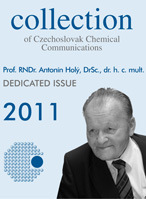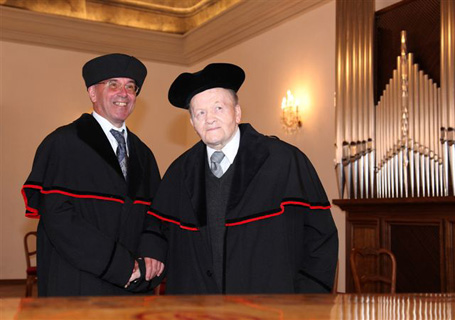
- ISSN 0010-0765 printed
- ISSN 1212-6950 electronic

Prof. RNDr. Antonín Holý, DrSc., dr. h. c. mult. - 75th Birthday - Foreword

Professor Antonín Holý was born on September 1, 1936 in Prague (Czechoslovakia). He graduated in organic chemistry from the Charles University in Prague in 1959 and obtained his Ph.D. degree at the Institute of Organic Chemistry and Biochemistry of the Czechoslovak Academy of Sciences in 1963. Since then he has worked at the Institute as staff scientist, head of the nucleic acid chemistry group (from 1983) and head of the Department of Bioorganic Chemistry (from 1987). During the period 1994-2002 he served as Director of the Institute. He was promoted to full professor in 2005 at the Palacký University in Olomouc. In 2011 he retired but still continues the work as emeritus scientist.
During his extraordinarily successful career he has published over 600 scientific papers (with over 10000 citations), out of which 283 were published in the journal Collection of Czechoslovak Chemical Communications, and a number of book chapters. He has always focused on the practical aspects and applications of his research and has filed over 60 patents and patent applications. His work has been honored by a number of prestigious prizes, including the Czechoslovak State Prize in 1986, the Descartes Prize of the EU in 2001, the Czech State Medal "Pour merit" in 2002, the "De Scientia et Humanitate Optime Meritis" (supreme medal of the Academy of Sciences of the Czech Republic), the "Prix Bohemia" for scientific achievements in 2004, the "Česká hlava" prize (the highest prize for science in the Czech republic) in 2007, and several honoris causa doctorates.
At the beginning of his independent career he dealt with the synthesis of di- and triribonucleotides from 2',3'-cyclic phosphates and, later on, with specific metabolically stable inhibitors (antimetabolites) by modification of nucleosides both at the heterocyclic base and on the sugar moiety (e.g. L-nucleosides). During his systematic study of simplified analogues of nucleosides he entered his fruitful collaboration with a virologist, Professor E. De Clercq, who studied the antiviral activity of his compounds. Together they discovered broad spectrum antiviral activity of 9-(2,3-dihydroxypropyl)adenine (DHPA), which was later found to inhibit SAH hydrolase and was developed and marketed as Duviragel®, a gel against herpes labialis. By introduction of a non-hydrolysable phosphonomethyl ether moiety to the structure of DHPA, a novel class of antivirals, acyclic nucleoside phosphonates, was discovered at the beginning of the 80's. Systematic studies of modifications of the heterocyclic, hydroxyalkyl, and phosphonate parts were performed, and several drug candidates have been licenced and developed by Gilead Sciences. So far, three compounds used in several commercial drugs have been approved and are currently in clinical use: Vistide® (used for treatment of retinitis in AIDS patients but potentially applicable for treatment of smallpox), Viread® (used for treatment of HIV and later also HBV), Hepsera® (for treatment of HBV), and combined drugs Truvada® and Atripla® (both for HIV treatment).
Throughout his career, Professor Holý has been a perfect example of true multi- and interdisciplinary research. He profited from his excellent organic synthesis background, but his strong affinity to biochemistry, biology, and medicine has resulted in a number of applications and fruitful collaborations. He has always been very keen on studying the mechanisms of action of his compounds, and such knowledge has helped him in the design and synthesis of further generations of active compounds. He has become a leading figure in medicinal chemistry of nucleic acid components, and his work has significantly influenced the research both in academia and in pharmaceutical industry. Most importantly, the compounds he developed now help to cure patients suffering life-threatening diseases.
This special issue of CCCC contain papers from his colleagues and friends who wish him all the best and many more years.
Michal Hocek
Editor-in-Chief

